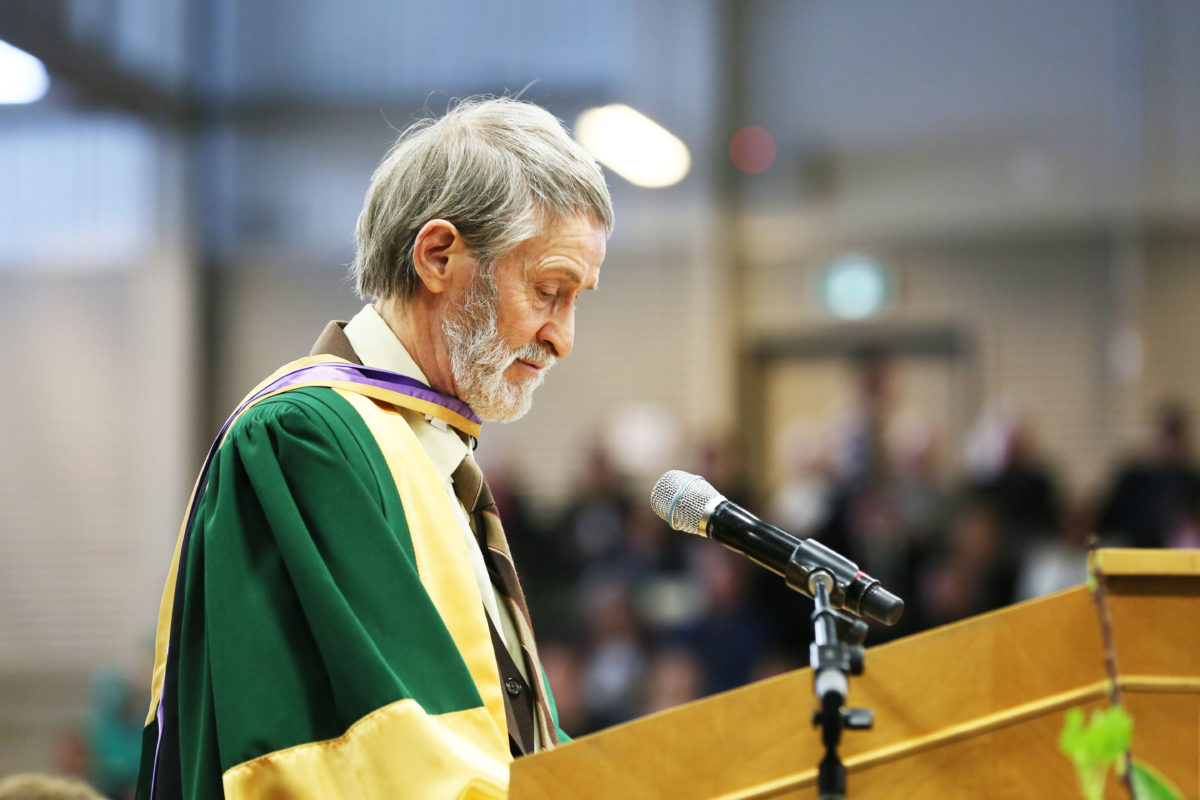When St. Thomas University fine arts professor William Forestall went to visit Raymond Fraser on Oct. 19, he saw something in the room that made him smile.
Forestall, Fraser and students in the fine arts department at St. Thomas had worked on a book called As I See It Now that features students’ photos paired with some of Fraser’s poems. When Forestall was visiting Fraser, he saw a copy of the book resting on the window ledge.
“I noticed that there weren’t too many things of a personal nature in the room, but he had three or four books on the window ledge and one of them was the students’ poetry book,” Forestall said.
The pair had been thinking of doing another book project together when Fraser died at the age of 77 on Oct. 22.
Fraser was a novelist, poet, short story writer, educator, freelance journalist and publisher.
He attended St. Thomas when it was still in Chatham, New Brunswick. He graduated with a Bachelor of Arts in 1964 and was given an honorary degree from St. Thomas in 2016. He has been called one of the most prolific New Brunswick writers, and friends are remembering him as a gentleman with a witty sense of humour who enjoyed mentoring others.
“I think he wound up being as close to famous as most of us are going to get,” said Forestall, who often saw Fraser walking in his neighbourhood.
“We wound up bumping into each other on these meandering walks … and this summer I didn’t see him around that much.”
In September, Forestall found out Fraser had cancer.
He said he’ll remember Fraser as that neighbour he was “lucky to get to know a little bit better.”
“He was a scholar and a gentleman – just a really decent fellow.”
While at St. Thomas, Fraser played hockey and football and co-edited the literary journal The Tom-Tom.
After graduation, Fraser moved to Montreal, where he created the Montreal Story Tellers Fiction Performance Group, which did readings in high schools around the city.
Senator David Adams Richards, a fellow St. Thomas alumnus and author, was a long-time friend of Fraser’s.
“I met him first when I had just turned 17 and he was a writer that was from Chatham. He lived in Montreal and he was home for the summer or he was home for part of the summer and I found out that this real writer from Montreal was home visiting Chatham,” Richards said.
“I borrowed my dad’s car and went over to visit him and so he was the first real writer I’d ever met. He was the first that put his life on the line to do the work and that’s what I wanted to do.”
Tony Tremblay, an English language and literature professor at St. Thomas, knew Fraser professionally and personally too.
“In a small town like Fredericton, I would bump into him at readings, at launches, at events around town and we kind of, you know, sparked up a friendship and then it went from there,” he said.
“When you’re an artist you have a whole network of friends that you don’t know that you have simply by the outreach of your work.”
Fraser wrote and co-authored 22 books, including 11 fiction stories, two biographies and six books of poetry. His writings explored poverty, alcoholism, crime and social inequality. Some of his most notable works include The Black Horse Tavern and The Fighting Fisherman. For his contributions to literature and culture, Fraser was the recipient of the Order of New Brunswick and the Lieutenant-Governor’s Award for High Achievements in the Arts.
Tremblay said Fraser was one of the bravest authors he’d ever met.
“He popularized a way of characterization that’s very, very unique in the country. He wrote about people who today we would describe as the underdogs,” he said.
Tremblay said there were only a couple other writers who were focusing on the underdog in the same way Fraser was.
“When Ray came along in the 60s, his approach wasn’t understated at all. He introduced us to the rogues, he introduced us to the drinkers, he introduced us to the beggars, to the fighters, to people who got kicked out of bars.”
Tremblay said Fraser introduced his audience to those characters for a particular reason – to give them nobility.
“He wasn’t trying to be colourful in his description of these rogue characters, but he was trying to elevate them so that they could exist on par with other literary characters that we were familiar with,” he said.
“What Ray does is he saves those characters from our easy judgement.”
Tremblay said Fraser was incredibly witty as well.
“He would always have a little grin and a twinkle in his eye and then you knew that he was pulling your leg or something,” Tremblay said.
“I never heard him say an angry word about anybody. He was a real gentlemen who always had a sharp comment to make, so you always had to follow along carefully or you’d miss it.”
When he wasn’t writing, Fraser loved listening to country music and taking walks.
“He actually wrote some country songs,” Tremblay said. “He was a great walker too. Ray walked all over the place. He biked all over the place. Ray liked to be on the move.”
Tremblay said Fraser enjoyed mentoring students and touring the province to talk to up-and-coming writers.
“He started as a young man and he had a vocation as a writer and he kept at it. He never gave up. He never quit,” Tremblay said.
“I hope New Brunswickers realize just what a gem Ray was and in his passing we’ve lost one of our major writers.”

